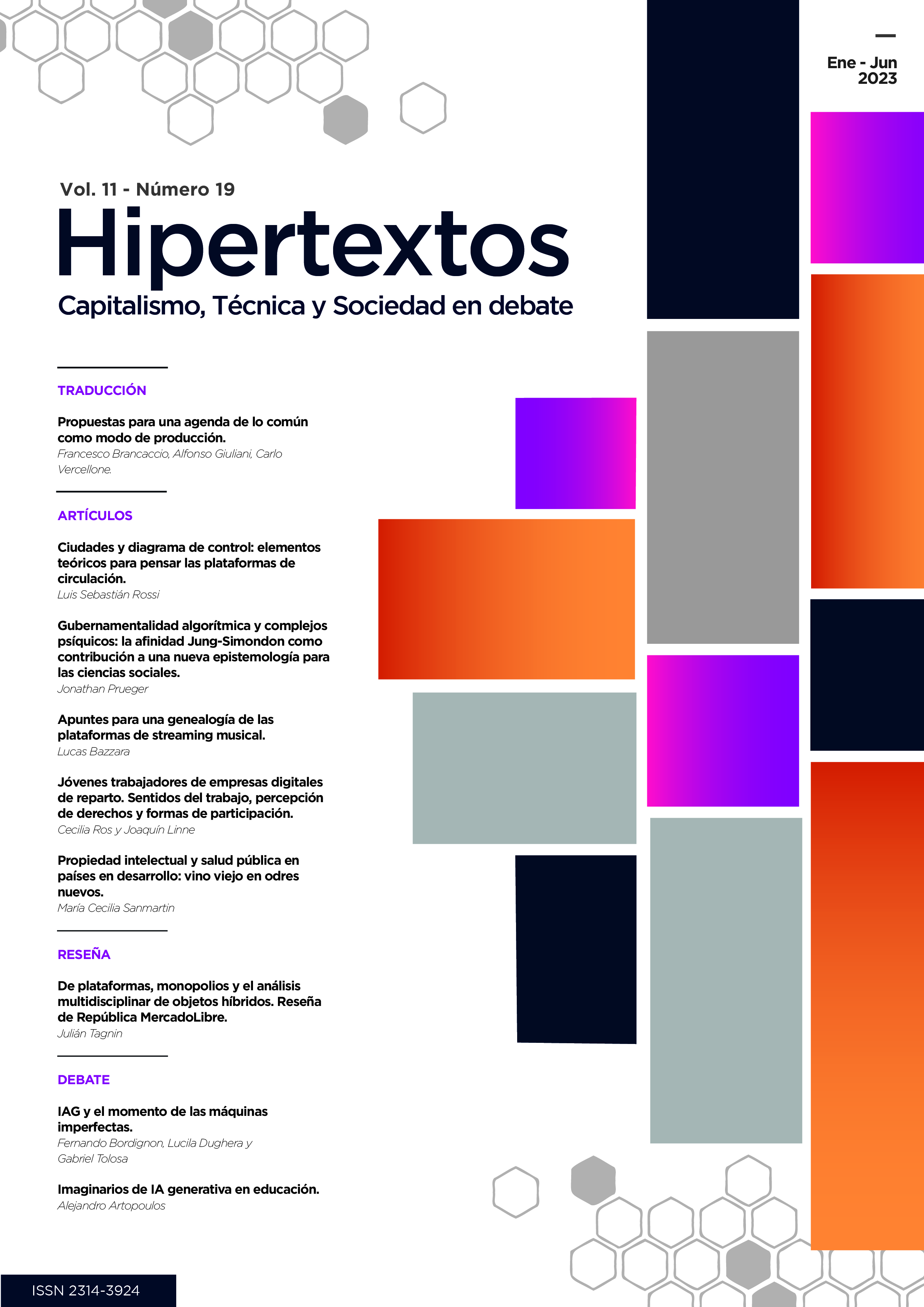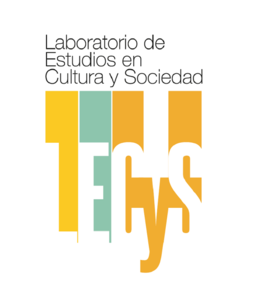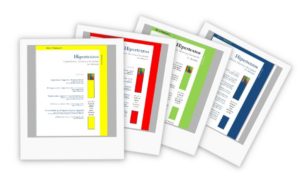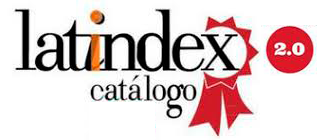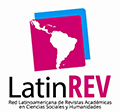Cities and control diagram
theoretical elements about circulation platforms
DOI:
https://doi.org/10.24215/23143924e063Keywords:
platformization, circulation, navigation and traffic, ride-hailing, powerAbstract
Latin American cities stage the dispersion of circulation, transport and mobility platforms. This theoretical paper seeks to retrieve conceptual contributions –from post-structuralism and media studies– that allow understanding platformization as realization of a control power operating on main events of multiplicities in open spaces. Therefore, firstly, it will recover some conceptual traditions that have perceived the growing comparisons –forged with the coming of late capitalism– between cities and information machines; these traditions, also, have extracted consequences for new modes of subjectivation. Then, this study will return to the notion of power relations diagram in cities (as reticular realities) and –with the distinction between data, directions and algorithms– the example of circulation will be researched. Finally, under the parallel between cities and media, the article will follow some updated power strategies in the deployment of navigation and traffic and ride-hailing platforms.
Downloads
References
Bratton, B. (2021). La terraformación. Buenos Aires: Caja Negra.
Braudel, F. (1984). Civilización material, economía y capitalismo, siglos XV-XVIII (Vol.1). Madrid: Alianza.
Barns, S. (2019). Platform urbanism. Springer.
Boundas, C. V., y Tentokali, V. (Eds.). (2017). Architectural and Urban Reflections After Deleuze and Guattari. Rowman & Littlefield.
Deleuze, G. (1987). Foucault. Barcelona: Paidós.
Deleuze, G. (1996). Conversaciones. Valencia: Pretextos.
Deleuze, G. (2007). Dos regímenes de locos. Valencia: Pretextos.
Deleuze, G. (2014). El poder. Buenos Aires: Cactus.
Dosse, F. (2009). Biografía cruzada. FCE.
Foucault, M. (1988). El sujeto y el poder. Revista mexicana de sociología, 50(3), 3-20.
Fourquet, Francois y Murard, Lion (1978). Los equipamientos del poder. Ciudades, territorios y equipamientos colectivos. Barcelona: Gustavo Gili.
Frichot, H. (ed.) (2016). Deleuze and the City. Edinburgh University Press.
Gabrys, J. (2016). Program earth: Environmental sensing technology and the making of a computational planet. University of Minnesota Press.
Genosko, G. (2015). Megamachines: From Mumford to Guattari. Explorations in Media Ecology, 14(1-2), 7-20.
Graham, S. (2016). Vertical: The city from satellites to bunkers. Verso Books.
Guattari, F. (2000 [1989]). Las tres ecologías. Valencia: Pretextos.
Guattari, F. (2000b). Cartografías Esquizoanalíticas. Buenos Aires: Manantial
Guattari, F. (2008). La ciudad subjetiva y pos-mediática. Colombia: Fundación Comunidad
Guattari, F. y Girard, C. (1994). Les machines architecturales de Shin Takamatsu. Chimères. Revue des schizoanalyses, 21(1), 127-141.
Hodson, M. et al. (2020). Urban Platforms and the Future City. Routledge.
Kittler, F. (2012 [1994]). Stuttgarter Rede über Architektur. En Engell, L., & Siegert, B. (eds.), Zeitschrift für Medien und Kulturforschung. Felix Meiner Verlag, 97-104
Kittler, F. (2018 [1988]). La ciudad es un medio. La verdad del mundo técnico. México: FCE.
Laurell, C. y Sandström, L. (2016). Analysing Uber in social media. International Journal of Innovation Management, 20 (05), 1-19, DOI: 10.1142/S1363919616400132.
Luque-Ayala, A. y Marvin, S. (2020). Urban Operating Systems. MIT Press.
McKelvey, F. (2018). Internet daemons: Digital communications possessed. University of Minnesota Press.
Mosco, V. (2017). Becoming digital: Toward a post-internet society. Emerald Group Publishing.
Moulier-Boutang, Y. (2007). Le capitalisme cognitif. Amsterdam Ed.
Mumford, L. (2011). El mito de la máquina, vol. 2. El pentágono del poder. Logroño: Pepitas de calabaza.
Ott, M. (2018). Dividuations. Springer.
Pinto, M.C. (2018). Waze e Centros de Comando e Controle. Tesis de Maestría. Universidad Federal da Bahía. Recuperada de: https://repositorio.ufba.br/handle/ri/27834
Raunig, G. (2022). Dividuum. Buenos Aires: Cactus.
Rodriguez, P. (2019). Las palabras en las cosas. Buenos Aires: Cactus.
Rossi, L. S. (2018). Agenciamientos en las sociedades de control. Revista CUHSO, 28 (1), 177-206.
Rossi, U. (2017). Cities in Global Capitalism. Polity.
Rouvroy, A., y Berns, T. (2016). Gubernamentalidad algorítmica y perspectivas de emancipación. Adenda filosófica, 1, 88-116.
Shekhar, S., y Vold, P. (2020). Spatial computing. MIT Press.
Silva, T. H., et al. (2013). Traffic condition is more than colored lines on a map: characterization of Waze alerts. En 5th International Conference on Social Informatics. 309-318. DOI:10.1007/978-3-319-03260-3_27.
Simondon, G. (2009). La individuación. Buenos Aires: La Cebra/Cactus.
Srnicek, N. (2018). Capitalismo de plataformas. Caja Negra.
Steinberg, M. (2019). The platform economy. University of Minnesota Press.
Szerb, L., Komlosi, E. S., Acs, Z. J., Lafuente, E., y Song, A. K. (2022). The Digital Platform Economy Index 2020. Springer.
van der Graaf, S. (2018). In Waze we trust: Algorithmic governance of the public sphere. Media and Communication, 6(4), 153-162.
van der Graaf, S., y Ballon, P. (2019). Navigating platform urbanism. Technological Forecasting and Social Change, 142, 364-372.
Vercellone, C. (2011). Capitalismo cognitivo. Buenos Aires: Prometeo.
Virilio, P. (2009). Le futurisme de l’instant: stop-eject. París: Galilée.
Zuboff, S. (2020). La era del capitalismo de la vigilancia. Barcelona: Paidós.
Zukerfeld, M. y Yansen, G. (2021). Plataformas. Una introducción: la cosa, el caos, humanos y flujos. Redes. Revista de Estudios Sociales de la Ciencia y la Tecnología, 27(53).
Downloads
Published
How to Cite
Issue
Section
License

This work is licensed under a Creative Commons Attribution-NonCommercial-NoDerivatives 4.0 International License.

